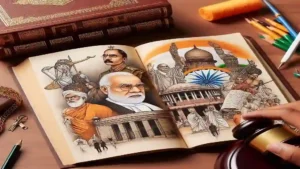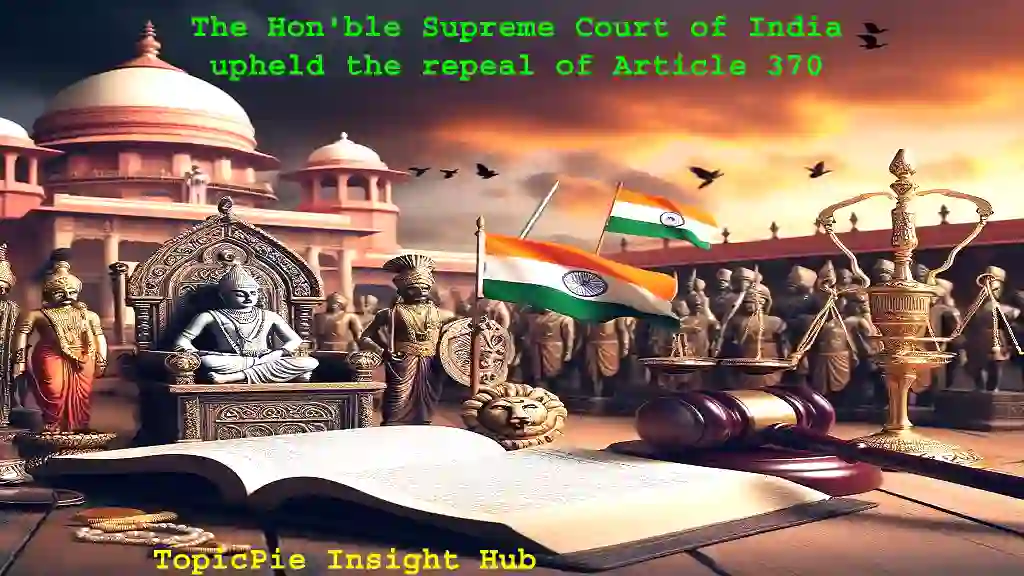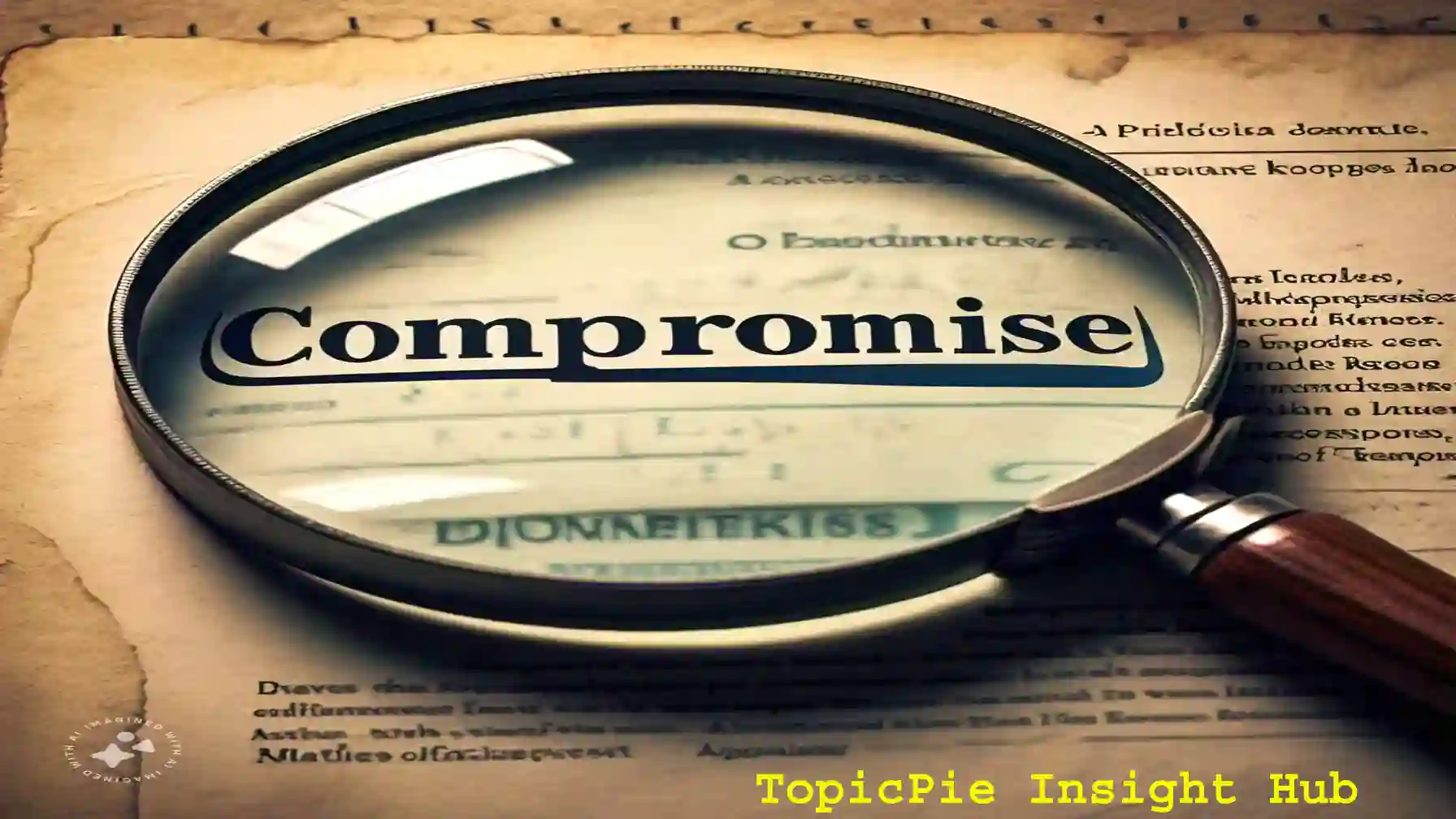In a landmark verdict, the Hon’ble Supreme Court of India upheld the repeal of Article 370. This granted special status to Jammu and Kashmir. This decision has far-reaching consequences for one of India’s most disputed territories and its people. Join us as we delve into the intricacies surrounding this historic judgement and explore its implications for both Jammu and Kashmir and the wider international community.
With tensions simmering for decades, understanding why Article 370 was repealed is crucial. We’ll offer an insightful overview, highlighting key elements from the Supreme Court’s verdict. This sheds light on the contentious issue. From there, we’ll delve into the background of Article 370 itself – its origins, evolution, and controversies sparked over time.
But what were the arguments presented during these momentous court proceedings? We’ll analyze both sides – those who supported repealing Article 370 and those who vehemently opposed it – giving you a well-rounded perspective on this divisive matter.
The impact on Jammu and Kashmir cannot be understated. We’ll explore how this landmark verdict will affect not only their socio-economic landscape but also have significant political ramifications that could shape their future. Additionally, we’ll examine what lies ahead for Jammu and Kashmir as they navigate through these uncharted waters.
It is not just within Indian borders that reverberations are being felt; internationally too, reactions to this ruling have been varied. Discover differing perspectives from around the globe as nations grapple with interpreting India’s actions concerning Jammu and Kashmir.
As we conclude our journey through this complex topic, evaluating the significance of such a pivotal judgement becomes paramount. Brace yourself for an engaging discussion filled with facts, analyses, potential scenarios moving forward – all aimed at unraveling the mysteries and impact of Article 370’s repeal. Let’s begin this illuminating journey collectively.
Understanding the Repeal of Kashmir’s Special Status:

The repeal of Article 370, which granted special status to Jammu and Kashmir, has been a highly contentious issue in India. To truly comprehend the significance of this decision, we must delve into its historical context.
Article 370 was introduced in 1949 as a temporary provision to grant autonomy to Jammu and Kashmir. It allowed the state to have its own constitution, flag, and control over certain matters such as internal governance. However, critics argued that it created a sense of separation from the rest of India and hindered national integration.
The Supreme Court’s verdict upholding the repeal is seen by proponents as a step towards ensuring equal rights for all citizens across India. They argue that removing special privileges will promote unity and development in Jammu and Kashmir.
Opponents, on the other hand, view this move as an erosion of regional identity and an attack on the unique cultural fabric of Jammu and Kashmir. They fear that without special status, their distinct heritage may be overshadowed or marginalized.
This decision not only impacts residents but also raises questions about international obligations toward resolving disputes like those between India and Pakistan over territories like Kashmir.
As we continue our exploration into this complex issue – examining arguments presented in courtrooms from both sides – it becomes clear that understanding why Article 370 was repealed requires careful analysis beyond surface-level perspectives.
Key Highlights from the Supreme Court Verdict:
The recent verdict by the Indian Supreme Court upholding the repeal of Kashmir’s special status under Article 370 has significant implications for the region. Here are some key highlights from this landmark judgment.
The court ruled that the constitutional changes made by Parliament to revoke Jammu and Kashmir’s autonomy were valid. This decision reaffirmed the central government’s authority over matters pertaining to J&K and marked a departure from its previous quasi-independent status.
The court emphasized that any claims challenging these constitutional amendments would be considered on their individual merits. This approach allows for a case-by-case evaluation of potential human rights violations or legal inconsistencies arising from these changes. This indicates a nuanced consideration of the impact of revocation.
Furthermore, while acknowledging concerns about restrictions on civil liberties imposed in response to security threats, the court noted that such measures should be temporary in nature and subject to periodic review. The judgment highlighted that safeguarding fundamental rights is crucial even during extraordinary circumstances.
Additionally, it is worth noting that despite upholding revocation, the court expressed its expectation for socio-economic development and good governance in Jammu and Kashmir. It stressed upon creating an inclusive environment where all stakeholders can participate actively in shaping their future.
These key highlights showcase the apex court’s comprehensive understanding of legal aspects and broader societal dynamics. The verdict aims to strike a delicate balance, recognizing individual challenges while upholding parliamentary decisions, between statehood aspirations and national integrity.
Implications of the Verdict for Jammu and Kashmir:
The Supreme Court’s decision to uphold the repeal of Article 370 has wide-ranging implications for the people and the region of Jammu and Kashmir. It signals a significant shift in India’s approach towards its relationship with this troubled state. By revoking their special status, the central government aims to integrate Jammu and Kashmir more closely into mainstream India.
From an administrative standpoint, this verdict will result in several changes. The state will now be divided into two separate union territories – Jammu & Kashmir and Ladakh – each with its own Lieutenant Governor appointed by the President of India. This move is expected to bring about better governance, improved development initiatives, and increased accountability.
Economically, experts believe that without Article 370’s restrictions on land ownership and investment, there will be an influx of businesses eager to invest in Jammu and Kashmir. This could lead to job creation opportunities for local residents as well as boost tourism in a region known for its breathtaking landscapes.
Politically, many argue that removing special status may help counter separatist movements by empowering marginalized communities who felt excluded from decision-making processes under Article 370. However, critics fear that this decision could further alienate some segments of society who have historically struggled against Indian rule.
It is crucial to keep an eye on how these implications unfold over time as they undoubtedly shape the future trajectory of Jammu and Kashmir amidst ongoing tensions in the region.

Exploring the Background of Article 370:
The background of Article 370 is a complex and historically significant aspect of India’s constitutional framework. It traces its origin to the tumultuous period leading up to India’s independence in 1947.
During the partition, Jammu and Kashmir had the option to accede either to India or Pakistan, given its predominantly Muslim population. The then ruler of Jammu and Kashmir, Maharaja Hari Singh, opted for temporary accession to India. This led to the inclusion of Article 370 in the Indian Constitution as a special provision granting autonomy to Jammu and Kashmir.
Article 370 allowed Jammu and Kashmir considerable powers over various aspects such as governance, legislation, citizenship rights, land ownership, and more. However, it also created a sense of separate identity for the region within the Indian Union.
Over time, controversies surrounding Article 370 emerged due to differing interpretations regarding its temporary nature versus permanent status. Some argued that it hindered integration with mainland India while others believed it protected the unique cultural heritage of Jammu and Kashmir.
These debates ultimately culminated in August 2019 when the Indian government decided to revoke Article 370 through a presidential order. This move was highly contentious and sparked widespread protests within Jammu and Kashmir.
Exploring the background of Article 370 provides insights into its origins as well as controversies surrounding its existence. Understanding these historical factors helps contextualize recent developments related to this constitutional provision.
The Origin and Evolution of Article 370
Article 370 granted special status to Jammu and Kashmir, with a complex history dating back to India’s independence in 1947. Initially, introduced as a temporary measure, it aimed to allow smooth integration of the princely state into the Indian Union.
Under this article, Jammu and Kashmir had limited autonomy over its internal affairs, including jurisdiction on matters such as defense, foreign affairs, and communications. However, over time, various amendments were made to the article that diluted its original intent.
Controversies around Article 370 intensified as it became evident that political parties misused it for vested interests. Critics argue that this special status hindered development, discouraging outside investment and preventing equal rights for all Indian citizens.
Despite these criticisms, supporters of Article 370 contend that it provided a sense of identity to the people of Jammu and Kashmir while safeguarding their cultural heritage. They argue that any changes should have been made through dialogue with local stakeholders rather than unilaterally imposed decisions.
The origins and evolution of Article 370 highlight how complex issues can arise from attempts at balancing regional aspirations with national unity. As we delve deeper into understanding this contentious provision, it is essential to consider both sides’ perspectives before drawing any conclusions about its impact on Jammu and Kashmir’s future trajectory.
Controversies Surrounding Article 370
Controversies surrounding Article 370 have been a long-standing issue in the political landscape of India. This constitutional provision, which granted special status to Jammu and Kashmir, has faced criticism from various quarters over the years. One major controversy revolves around the argument that Article 370 promotes separatism and hampers integration with the rest of India.
Critics argue that by granting Jammu and Kashmir its own constitution, flag, and autonomy in matters other than defense, foreign affairs, and communication, Article 370 perpetuates a sense of separate identity among the people of this region. They believe that this provision acts as a barrier to full integration with the Indian Union.
Another point of contention is related to socio-economic development. Critics claim that due to certain restrictions imposed by Article 370 on land ownership and employment opportunities for non-residents in Jammu and Kashmir, economic growth in the region has lagged behind compared to other states in India.
Also Read: 26/11 Mumbai Attack: A Tragic Incident That Shook the Nation
Opponents also raise concerns about gender discrimination resulting from certain provisions under Article 35A – an offshoot of Article 370. It is argued that these provisions deny women their rightful inheritance if they marry outside Jammu and Kashmir.
On the other hand, proponents of preserving Article 370 argue that it provides necessary protection for the unique cultural identity of Jammu and Kashmir. They contend that scrapping or diluting this provision would erode their distinctiveness as a region.
Additionally, some advocates highlight how Article 370 has acted as a safeguard against potential demographic changes by limiting land acquisition rights for outsiders. They view it as crucial for preventing any undue influence on local demographics or altering regional dynamics significantly.
The controversies surrounding Article 370 have been deeply polarizing within Indian society itself. The recent Supreme Court verdict upholding its repeal only adds fuel to an already heated debate concerning territorial integrity versus regional autonomy—a debate likely far from reaching its conclusion anytime soon.
Analyzing the Arguments Presented in Court:
During the Supreme Court hearings on the repeal of Article 370, various arguments were put forth by both proponents and opponents. Proponents argued that repealing Article 370 would lead to greater integration of Jammu and Kashmir with the rest of India. They maintained that it would promote equal rights and opportunities for all citizens, irrespective of their domicile status.
On the other hand, opponents raised concerns about potential erosion of Kashmir’s autonomy and identity. They argued that Article 370 was a key safeguard for protecting the unique cultural, political, and economic interests of Jammu and Kashmir.
Proponents claimed that removing special privileges accorded to Jammu and Kashmir under Article 370 would facilitate development in the region. They contended that it had hindered investment opportunities due to restrictions on land ownership by non-Kashmiris.
Opponents countered these claims by highlighting how repealing Article 370 could impact demographic changes in Jammu and Kashmir. They warned against diluting its Muslim-majority identity through increased settlement from outside the region.
The court carefully considered these arguments before reaching its verdict on upholding the repeal of Article 370. The judgment took into account constitutional provisions, historical context, as well as socio-political considerations while delivering this landmark decision.
It is important to note that analyzing these arguments does not simply entail choosing sides or dismissing opposing viewpoints outright. Rather, it involves critically examining each perspective in order to gain a comprehensive understanding of this complex issue.
In doing so, we must recognize valid concerns expressed by both proponents and opponents. These concerns relate to the implications of removing Jammu and Kashmir’s special status under Article 370. It is only through careful analysis that we can navigate towards a more nuanced understanding of this significant legal development concerning one of India’s most contentious regions.
Proponents of the Repeal of Article 370
Many proponents argue that the repeal of Article 370 is a significant step towards achieving integration and unity in India. They believe that this move will help in dismantling the separatist sentiment and terrorism prevalent in Jammu and Kashmir.
One of their key arguments is that Article 370 had prevented economic development in the region by discouraging investment and hindering industrial growth. They argue that without special status, Jammu and Kashmir can now benefit from various central government schemes, leading to improved infrastructure, job opportunities, and overall prosperity.
Additionally, proponents emphasize that repealing Article 370 will bring about gender equality by granting property rights to women who marry outside the state. They believe it is unfair for women to lose their inheritance rights based on their choice of spouse.
Supporters argue that corrupt politicians used Article 370 as a tool to manipulate power dynamics in Jammu and Kashmir. By removing this special provision, they claim it will pave the way for transparent governance and accountability.
Those supporting the repeal see it as necessary for integrating Jammu and Kashmir into mainstream India. They aim to foster socio-economic progress, ensure equal rights for all citizens, regardless of gender or marital choices, and promote corruption-free governance.
Opponents of the Repeal of Article 370

Several voices strongly oppose the repeal of Article 370 and changes to Jammu and Kashmir’s special status. They argue it infringes on people’s rights and autonomy in the region.
Critics raise one key concern: removing Article 370 undermines Kashmir’s unique identity, eroding cultural heritage, language, and the distinct political system protected for decades.
Furthermore, opponents claim that repealing Article 370 without adequate consultation with local stakeholders ignores their aspirations and fails to address long-standing grievances. They argue that any changes made should be done through a democratic process involving all parties concerned.
Critics also express concerns about potential demographic shifts as a result of opening up land ownership in Jammu and Kashmir. They fear an influx of outsiders could disrupt social fabric, alter demographics, and threaten economic opportunities for locals.
Additionally, some opponents worry about human rights violations amidst increased security measures imposed in response to protests against these changes. They argue that excessive use of force can further alienate residents and escalate tensions in an already volatile region.
Those skeptical of the repeal emphasize preserving Jammu and Kashmir’s uniqueness while addressing genuine concerns through dialogue rather than unilateral decisions imposed from above.
Impact on the Residents of Jammu and Kashmir:
The Supreme Court’s verdict upholding the repeal of Article 370 has undoubtedly had far-reaching implications for the people of Jammu and Kashmir. It is crucial to examine these consequences, particularly in terms of socio-economic factors and political ramifications.
Socio-Economic Consequences:
The revocation of Article 370 has opened up new avenues for development in Jammu and Kashmir. With central government control now established, there are opportunities for infrastructure projects, investment, and economic growth. This could potentially lead to job creation, improved living standards, and increased access to education and healthcare facilities for the people of this region.
Political Ramifications:
From a political standpoint, the removal of special status has resulted in significant changes. The reorganization of Jammu and Kashmir into two separate union territories – J&K (with a legislature) and Ladakh (without a legislature) – has altered power dynamics within the region. Local politicians who previously held influence may see their positions challenged or diminished as central government control takes precedence.
Furthermore, the decision to downsize autonomy raises concerns about democratic representation within Jammu and Kashmir. Some argue that this move undermines local governance structures while others believe it will bring stability by integrating the region more closely with India.
Also Read: Animal Box Office Collection Day 12 | Animal Movie Day 12 Advanced Booking Report | Animal Day 12 Box Office Collection Update.
The impact on the people of Jammu and Kashmir following the Supreme Court’s judgment on Article 370 is multifaceted. While there are potential benefits such as enhanced development opportunities, job creation, improved infrastructure, education accessibility, healthcare facilities; there are also apprehensions regarding political representation at a local level.
International Reactions:
As anticipated with such a significant decision affecting territorial sovereignty within India; international reactions have been varied. Countries like Pakistan strongly criticize India’s actions, citing concerns over human rights violations. Other nations have remained silent or expressed cautious support.
Overall, the long-term effects on individuals residing in this disputed territory remain uncertain. Closely monitor the situation to ensure the protection of the rights of Jammu and Kashmir residents. Their voices must be heard in decision-making processes affecting them.
Socio-Economic Consequences
The Supreme Court’s verdict upholds the repeal of Article 370, impacting Jammu and Kashmir socio-economically. The revocation is expected to bring both positive and negative changes to various aspects of life.
One potential consequence is the opening up of new avenues for economic development. With the removal of restrictions on land ownership, non-residents can now invest in businesses and industries in Jammu and Kashmir. This could lead to an influx of capital, job opportunities, and overall economic growth in the region.
However, there are concerns about how this might affect local businesses. Some fear that increased competition from outside investors may threaten small-scale enterprises that have traditionally relied on protectionist policies under Article 370.
Additionally, there are worries about demographic changes resulting from outsiders settling in Jammu and Kashmir. Critics argue that this could lead to a loss of cultural identity for locals who have long cherished their distinct heritage.
On a positive note, it is hoped that greater integration with mainland India will provide better access to education, healthcare, infrastructure development, and other public services. Improved connectivity could bridge existing gaps between urban centers and remote areas within Jammu and Kashmir.
Nevertheless, challenges lie ahead. Authorities must ensure equitable resource distribution across all Jammu and Kashmir regions, addressing local youth unemployment.
It remains crucial for policymakers to navigate socio-economic consequences carefully. Inclusive policies should address concerns without compromising larger objectives.
By understanding these ramifications at a deeper level, we gain insight into the future for people in this previously autonomous region. Nestled amidst breathtaking landscapes, this region holds both challenges and opportunities.

Political Ramifications
The repeal of Article 370 has undoubtedly ushered in significant political ramifications for the state of Jammu and Kashmir. With its special status revoked, the region stands on equal footing with other Indian states. It no longer enjoys autonomous powers over key aspects like land ownership and legislation. Some hail this move as a step toward greater integration and unity, while others see it as infringing on people’s rights.
For proponents of the repeal, this decision represents a long-awaited opportunity to fully integrate Jammu and Kashmir into India. They argue that Article 370 had fostered separatism and hindered development in the region. By bringing it under direct central control, they believe that Jammu and Kashmir can benefit from increased investment, infrastructure development, and access to national welfare schemes.
However, opponents see this move as an erosion of Jammu and Kashmir’s unique identity. They argue that revoking Article 370 undermines the principles of federalism enshrined in India’s constitution. Moreover, concerns have been raised about potential demographic changes in the region due to non-residents being able to purchase land there now.
With conflicting viewpoints dominating public discourse surrounding this issue, political tensions are running high within Jammu and Kashmir itself. The main regional parties who once held power based on their stance towards Article 370 find themselves navigating uncharted waters amidst changing dynamics.
As political alliances shift, new strategies emerge. All stakeholders, from mainstream politicians to separatist groups, are formulating plans. Jammu and Kashmir’s future elections will play a crucial role in defining its political landscape.
The repeal of Article 370 has significant political ramifications for Jammu & Kashmir. Proponents advocate greater integration into India’s framework, while opponents decry it as undermining their unique cultural heritage.
The Way Forward: What Lies Ahead for Jammu and Kashmir:
As the Supreme Court of India upholds the repeal of Article 370, it is essential to look ahead and consider what lies in store for Jammu and Kashmir. The decision has undoubtedly set a new course for the region, with significant implications on various fronts.
From a socio-economic perspective, the way forward for Jammu and Kashmir involves focusing on development initiatives that can uplift the lives of its people. This entails investing in infrastructure projects, promoting tourism, attracting investments, and creating employment opportunities. By harnessing its natural beauty and cultural heritage, Jammu and Kashmir can become an economic powerhouse.
Politically, effective governance structures need to handle administrative duties efficiently. Local leaders must foster unity while addressing concerns about representation and participation in decision-making processes within the region.
Also Read: Henry Kissinger: A complex and controversial figure in global diplomacy
Engaging with all stakeholders will be crucial in order to build trust among different sections of society. Facilitating dialogue between political representatives from Jammu and Kashmir as well as central authorities can help address grievances effectively.
Furthermore, empowering grassroots institutions, like local bodies or Panchayats, is vital for inclusive development. Strengthening democratic institutions allows citizens’ voices to be heard effectively in shaping policies impacting their lives.
Additionally, efforts should also be made towards reconciling any grievances or discontent that may have arisen due to historical issues or past conflicts. Promoting peacebuilding measures through dialogue platforms can help bridge gaps between communities and foster harmony within the region.
At an international level, it’s imperative for India to diplomatically engage with neighboring countries like Pakistan. This helps maintain regional stability and explore collaboration opportunities on shared interests such as trade or tourism promotion.
Looking ahead is crucial. Acknowledging past mistakes while learning from them allows for a more informed, inclusive approach. By embracing challenges and opportunities, Jammu and Kashmir can emerge as a beacon of progress and prosperity in the region.
International Reactions and Perspectives:
The Supreme Court’s verdict on the repeal of Article 370 has sparked interest and garnered reactions from various countries around the world. Many nations have closely followed the developments in Jammu and Kashmir, given its geopolitical significance.
Neighboring countries like Pakistan and China have expressed strong reservations about India’s decision to revoke Kashmir’s special status. They view it as a violation of international law. It is considered an infringement on the rights of the people of Jammu and Kashmir.
On the other hand, countries like the United States, Russia, France, and Germany approach India’s actions cautiously. They consider it an internal matter but stress resolving issues through peaceful dialogue between India and Pakistan.
International organizations, including the United Nations (UN), call for restraint to prevent further escalation in the region. The UN emphasizes respecting human rights while addressing concerns about security or governance in Jammu and Kashmir.
International reactions reflect a complex mix of perspectives. They are based on individual country interests, historical alliances, regional dynamics, and broader geopolitical considerations. It remains to be seen how these varying viewpoints will shape future discussions on Jammu and Kashmir at international forums.
Conclusion: Assessing the Significance of the Supreme Court Verdict
The Supreme Court’s decision upholding the repeal of Article 370 marks a significant turning point in Jammu and Kashmir’s history. The verdict reaffirms the government’s stance on integrating the region more closely with India. It raises questions about its impact on various aspects.
From a legal perspective, this judgment solidifies the constitutional validity of abrogating Article 370. It paves the way for further legislative changes in Jammu and Kashmir. It establishes that special provisions can be amended or revoked if deemed necessary by duly elected representatives.
However, it is important to acknowledge that this verdict is not without its critics. Many argue that it undermines Jammu and Kashmir’s autonomy and distinct identity, potentially leading to social unrest. The socio-economic consequences are uncertain. Some fear that revoking Article 370 may adversely impact employment opportunities, land ownership laws, and cultural preservation.
Politically speaking, this decision reshapes power dynamics within Jammu and Kashmir by removing its special status. It opens doors for increased central control over governance mechanisms while challenging existing political structures in place.
Looking ahead, stakeholders must focus on fostering unity among diverse communities in Jammu and Kashmir. This is crucial for future harmony. Efforts should center around addressing grievances effectively through dialogue rather than perpetuating division or exclusionary practices.
Internationally, reactions to this verdict vary greatly depending on countries’ geopolitical interests. Some nations view it as an internal matter. Others express concerns about human rights, potential escalation, especially over territories like Gilgit-Baltistan between India and Pakistan.
Assessing the significance of this complex issue requires careful consideration. It involves legalities, socio-economic impacts, and political ramifications, all intertwined with regional security dynamics. As time progresses, it remains essential to closely monitor developments in Jammu and Kashmir. Evaluate the actual outcomes of this verdict on the ground.









Great news! The Supreme Court’s decision to uphold the repeal of Article 370 signifies a monumental step towards unity, progress, and equality for all citizens in India. This move paves the way for inclusive development and integration, fostering a stronger, more unified nation. Kudos to the judiciary for upholding this historic decision! 🇮🇳✨ #Article370 #UnityInIndia